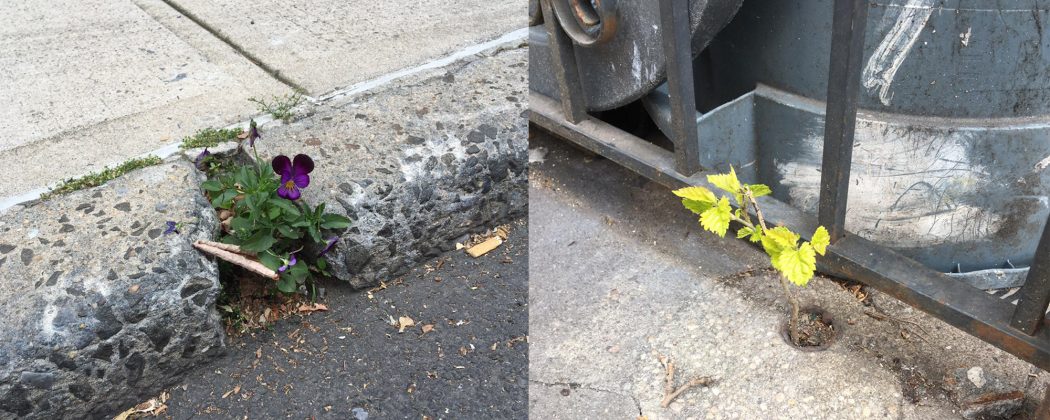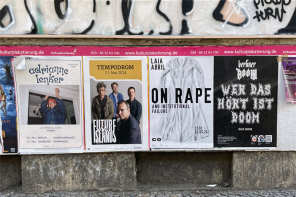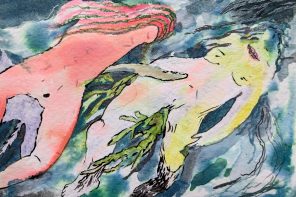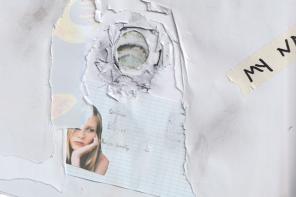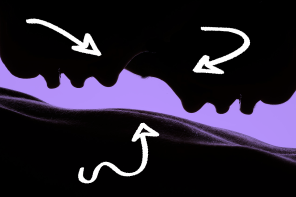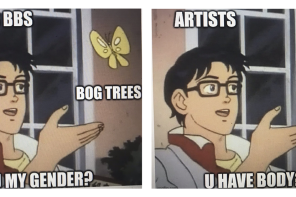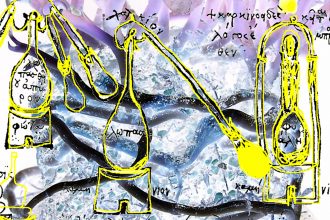Audio transcription:
During the Corona time, I have been hearing the word “Normalität” almost daily in the news: the eagerness to return to “normality.” The following poem is a small glimpse of my normality.
你好
I used to speak Chinese very well
no, I am not Chinese
I liked the depth of the language and studied it
many characters stem from depictions of what the ‘things’ look like
for example
川 means ‘stream, river, flow’ – do you see the water flowing?
心 means ‘heart’ – do you see the shape of the heart?
whether one has studied Chinese or not
你好
is Chinese that everyone seems to know
many people have an irresistible urge to toss it at me as I pass by
I am the magnet, the attractor of 你好
你 consists of three (1+2) parts
亻on the left is a form of 人, which means ‘people, mankind’ (1)
尔 on the right means ‘you, that, those’ and is made up of
冖 meaning ‘cover’ and 小 ‘small, insignificant’ (2)
你 means ‘you’ (1+2)
(when a heart 心 goes under you 你, 您 becomes a polite form of ‘you’)
好 consists of two (1+1) parts
女 means ‘woman’ (1)
子 means ‘son, seed, child, egg, small thing, 1st terrestrial branch,’ and so on (1)
好 means ‘good, well, proper, very,’ and so on (1+1)
你好 is a Chinese greeting of ‘hello’
Are you well?
endless strangers ask me if I am well by blurting out 你好 on the streets
it has a negative effect on my wellness
你好 ha ha ha
你好 he he he
my existence seems to have been compressed into these two letters, 你好
the speakers’ faces are punctuated with smirks and laughter
honoring the grace of the language I am greeted with
I contemplate ways to respond gracefully
I think of the equivalent of 你好 in my mother tongue
안녕
안녕 is asking if you are in peace and tranquility without troubles
when written in characters
안 is安
녕 is寧
安 means ‘peaceful, tranquil, quiet’
寧 means ‘repose, serenity, peace’
a lot of peace and calm
this is comforting
the first letter of my first name
인 is 仁
仁 is the highest virtue in Confucianism
it means ‘generous, sensitive, loving, compassionate, wise,’ and so on
I really like the second letter, 경 (景), for having so many very different meanings
景 means ‘sun, shadow, warm wind, beautiful scenery, shine, big,’ and so on
all of the above inspection tells me:
Depth
to have depth
to know and remember that there’s so much depth under the thin surface of things
to find peace in this knowing
to take joy and celebrate this depth in all the ways that my name invites
this is grace
a poem I live with my body
My body. Have I lost touch with it from the inside, while trying to protect it from the outside? Here is another piece of normality from my life:
I like Asian girls
You will be my next Asian girlfriend
In order to live on
I just press Delete
my previous boss at work used to say
Oh there goes your friend
whenever an Asian person would walk by
You need a boyfriend
Are you a virgin? I’d like to have a baby with you
I often exploded with anger
he got a little scared of me
(although he would deny it
as he always said
I am not scared of anything!)
Then, he would go
I only listen to you and my wife in this whole world!
I came to accept that
he would never change
I quit the job
In order to survive
I just press Delete
I have been normalizing my normality. Erasing myself has become normal. Speaking up has felt like being dull and weak, like exaggerating and overreacting. When I did speak up, the common response was disapproval, shaming, and silencing. I grew tired of facing these situations. I wanted to live with some degree of joy. I learned to not talk much about myself. I learned to press Delete when something was “not worth spending my emotion over.”
My body is real. My thoughts are real. My feelings are real.
My skeletons are real. My sight is real. My sorrow is real.
My pores are real. My perception is real. My pain is real.
My heart is real. My hunger is real. My hope is real.
I am real. I just stepped out to buy some fruit. The guy who works there weighed my nectarines and put a price tag on them. He pointed to the strawberries and said, “Do you want strawberries? They are from China.” I replied, “But they say here that they are from Germany.” He smirked and said, “I was joking.” A usual encounter. Am I real?
My body is real. During the Corona time, my sense of wellbeing around my house has diminished. I began to feel wary of stepping outside. Last weekend, a friend came over. We lounged by the canal until a storm started to gather in the sky. When we arrived at my place, my friend expressed alarm by what she had witnessed on our walk. She insisted that some real violence had been inflicted on me and that I needed urgent help, while I repeatedly asked her if this was not an exaggeration. By this point, the storm was in full swing. Is my body real?
My thoughts are real. I see my fingers dialing the hotline for Violence Against Women. I wait for a long time as I listen to the sad connection music and a voice saying to “CALL THE POLICE if this is an emergency.” How are the women who cannot afford to wait for so long supposed to get help? If they call the police instead, will they get help? “A man who lives in my building has been staring at me, following me, trying to make some physical contact,” I say. They ask if I have called the police. My voice gets a bit irritated. They tell me I can either call the police or they can give me the number of a Women’s Center near me. I would have to wait until Monday to call the center. Are my thoughts real?
My feelings are real. It is difficult to be actively seeking help when I feel the constant tug of sadness underneath my heart. Counselor #1 questions the reality of the situation. She asks if the appearance of the man reminded me of someone from past traumas. She adds that my culture may have prevented me from screaming and reacting in a way that would keep the guy away. “I’ve spoken with some people from China and Korea,” she says. Counselor #2 emphasizes repeatedly that this is not happening only to me, but to every young and single woman. Are my feelings real?
My sadness is real. Over the years, I have learned to appreciate simple joys in life. Light shining through the leaves. Gentle sound of trees in the wind. Water touching my skin. I have also learned, however, that the simplest things are often the hardest. To be brave. To let go. To forget. To feel my feelings and know they are true. When I return home from encountering street harassment, I am especially happy to see my cat. She probably doesn’t care what I look like. I yearn for human touch, gentle holding that slowly spreads courage inside my body, like a drop of ink dissolving in water. I hold my cat in my arms. Is my sadness real?
I am a human. My neighbor and friend knocks on my door. I tense because another neighbor guy (not the one I called the hotline for) has been knocking on my door on random nights. It is a relief to see my friend and not the guy. We go out for a drink in a neighborhood bar. The guy comes out and stands a ways away, facing us as he chats on his phone for almost the whole time we are sitting there. I walk with my friend to a Späti. On our way back, some guy suddenly steps in very close to my face and shouts, “Chinatown!” I am almost entertained by how uncreative people can be in formulating these assaults. Once some boys shouted “sushi” at my face. Am I a human (or sushi)?
My pain is real. It is painful to hear myself questioning my efforts to get help. My friend who initially persuaded me asked her therapist about it. The therapist said that my friend gave me “rational advice.” Still, I hear myself asking, “Is it really not an exaggeration?” The storm is wild outside. It feels cleansing. I make dinner for us. My friend asks about an online class that I have been attending. I admit to my friend in a light manner that something the instructor says has been bothering me. The instructor often addresses us as a “bunch of white people.” I hear myself telling my friend that perhaps the instructor thinks I am white. Yes, we have met before in real life, but maybe they don’t realize that I am the same person? Through the video, perhaps I look white? When my friend says that it is very clear even on video that I am not white, I begin to laugh hysterically. Tears roll down my face. My words sound ridiculous, unreal, to my ears. How have I gotten so used to erasing myself? Is it because I am safe when unseen? This becoming invisible in a group of mostly white people has happened before. When I tried to point it out, it cost me a tremendous amount of emotional energy, and went unacknowledged in the end. I hear myself telling my friend that in these situations, I wonder whether the group does not see me, does not count me, or thinks I am white. My friend frowns and comments that all of these options are not very good. I laugh again. It is painful to hear myself say these things. Is my pain real?
imagine we’re whales
we can hold our breath for three hours
and go
to the very bottom of
the ocean
one
two
three
it is quiet
the water is warm
i am big and weightless
my heart beats slow
so much space
so many colors
so much life
endless
depth
Words and Header Image by Inky Lee
Inky Lee is a Berlin-based artist, originally from South Korea, who makes performance, music, video, and text.

